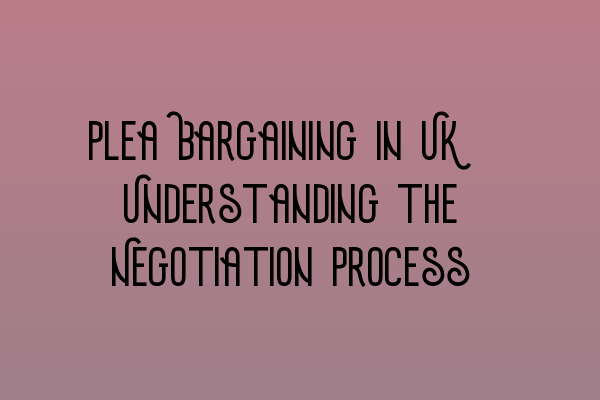Plea Bargaining in UK: Understanding the Negotiation Process
Welcome to SQE Criminal Law & Practice Law UK, where we provide expert advice and information on various legal aspects. Today, we will be discussing an important topic that plays a significant role in the criminal justice system – plea bargaining in the UK.
What is Plea Bargaining?
Plea bargaining refers to the negotiation process between the prosecution and defense, where the defendant agrees to plead guilty to certain charges in exchange for reduced charges, a lighter sentence, or other advantages. It is a common practice in many legal systems, including the UK.
In plea bargaining, both parties work together to reach a mutually beneficial agreement. This negotiation process often takes place before the trial begins, allowing the parties to save time and resources. It also helps in resolving cases efficiently and reducing the burden on the court system.
Understanding the Negotiation Process
The plea bargaining process involves several key steps:
- Assessment: The defense thoroughly assesses the strengths and weaknesses of the case, considering the evidence, witness testimonies, and legal precedents. This evaluation helps in determining the likelihood of success at trial and the potential risks involved.
- Prosecution’s Offer: The prosecution presents an initial offer, outlining the charges the defendant should plead guilty to and the potential concessions they are willing to make. This offer is based on their assessment of the case and their objectives.
- Defense’s Counter-Offer: The defense evaluates the prosecution’s offer and formulates a counter-offer. This may involve suggesting different charges, seeking a reduced sentence, or proposing alternative resolutions that align with the defendant’s interests.
- Negotiation and Bargaining: Both parties engage in negotiations, exchanging offers, counter-offers, and arguments to reach a middle ground. This stage requires effective communication, strategic thinking, and legal expertise to present compelling arguments and maximize the benefits for the defendant.
- Final Agreement: If the parties reach a consensus, a final agreement is reached, specifying the charges the defendant will plead guilty to and the agreed-upon terms. This agreement is then presented to the court for consideration and approval.
It is important to note that plea bargaining is not always successful. If the parties fail to reach an agreement, the case proceeds to trial, where the defendant’s guilt or innocence will be determined by the court.
Importance of Plea Bargaining
Plea bargaining offers several advantages to both the prosecution and defense:
- Efficiency: By resolving cases outside of a lengthy trial, plea bargaining helps save time and resources for both the court system and the parties involved. It allows for a more efficient administration of justice.
- Certainty: Plea bargaining provides a level of certainty, as the defendant knows the charges they will face and the potential consequences. This certainty allows for informed decisions and strategic planning.
- Flexibility: Plea bargaining allows for creative resolutions that may not be possible through a trial. It provides an opportunity for the defendant to secure a more favorable outcome, such as a reduced sentence or alternative charges.
Understanding the plea bargaining process is crucial for both aspiring solicitors and legal professionals. To prepare for the SQE exam and gain a comprehensive understanding of criminal law and practice, we recommend SQE Exam Prep: Essential Study Materials for Aspiring Solicitors.
Expert testimonies play a vital role in criminal cases. To learn more about the importance of expert testimonies and how they contribute to building strong cases, read our article on Expert Testimonies in UK Courts: Building Strong Cases.
For international lawyers preparing for the SQE exam, we provide valuable insights and strategies in our article on SQE Exam for International Lawyers: Challenges and Success Strategies.
To understand the format and requirements of the Solicitors Qualifying Examination (SQE), refer to our article on Demystifying the Solicitors Qualifying Examination Format.
If you’re an entrepreneur planning to establish an LLC in the UK, our step-by-step guide on LLC Formation Made Simple: Step-by-Step Guide for UK Entrepreneurs will provide you with the necessary information and guidance.
At SQE Criminal Law & Practice Law UK, we strive to offer comprehensive resources and expert advice to help you succeed in your legal career. Stay tuned for more informative articles and valuable insights.
